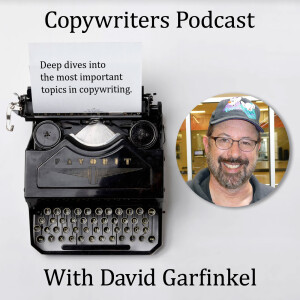
A big question, maybe THE big question, copywriters ask themselves when they sit down to write, is this: “Where do I start?” Of course you’ve got to already know... your product and its benefits. You’ll need to put together the best offer possible. You may need an origin story for the product. Knowing the price and guarantee are important. But this is all for naught if you don’t have a deep and thorough understanding of your PROSPECT. Because if you’re selling to the wrong person -- or to nobody in particular -- your copy is not very likely to work. I came across eight killer questions -- not for copywriting, but for writing screenplays. From the excellent new book, “The Protagonist’s Journey,” by successful screenwriter and college professor Scott Myers. These questions on his list are for getting to know the hero of the film you are planning to write. Today, though, we’ll look at how we can tweak these questions just a little to create a very powerful tool for anyone who writes copy. Just like with a screenplay, a copy project can seem completely out of control when you start, too. So, in the same way, the same questions, converted for copywriting, will help you get to know your prospect very specifically and in important ways. Three reasons these questions are so valuable: 1. They get you out of your client’s head and into your prospect’s head, where the sale is actually made. (or, if you’re writing for yourself, out of your own head and into the prospect’s head) 2. These questions force you to zero-in on important parts of your copy which are easy to overlook — but, because it’s so easy to overlook them, a lot of people do. Now you don’t have to. 3. These questions unearth and explore the many facets of emotional motivation in your prospect — the secret ingredient missing from so many sales letters, and the one thing that propels conversions into the stratosphere. I’m going to give you a couple different ways to use these questions. A long way, and a short way. The long way is to go through the questions methodically and write out the answers. And research, or think deeply about, the questions you can’t already answer. That’s not going to work for everyone, all of the time. So there’s a much faster way you can still benefit from these questions. And that’s this: Use the questions as a quick checklist, before you write. To make sure you have the questions answered in your own mind or in your prework. And fill in quickly wherever you come up short. Here are the questions, which we discuss in some detail on the podcast: 1. Who is the prospect? 2. What does the prospect want? 3. What does the prospect need? 4. What is the eventual resolution of the prospect’s want and need? 5. What is at stake for the prospect? 6. Who or what opposes the prospect? 7. What does the prospect fear the most? 8. Why does this prospect need to have this product at this time? The book is: The Protagonist’s Journey, by Scott Myers https://www.amazon.com/dp/3030796817
Download.
More Episodes
The Shortest Killer Pitch You’ve Ever Seen
 2024-01-22
2024-01-22
 2024-01-22
2024-01-22
Two Key Deep Dives For Copywriters
 2023-12-04
2023-12-04
 2023-12-04
2023-12-04
The Comic Book Copywriting Secret
 2023-11-27
2023-11-27
 2023-11-27
2023-11-27
Why You MUST Be Interesting
 2023-10-23
2023-10-23
 2023-10-23
2023-10-23
The Little-Known Power of Microstories
 2023-10-09
2023-10-09
 2023-10-09
2023-10-09
Fast Path To Short Copy
 2023-10-02
2023-10-02
 2023-10-02
2023-10-02
Bullet Points That Increase Sales
 2023-09-11
2023-09-11
 2023-09-11
2023-09-11
012345678910111213141516171819
Create your
podcast in
minutes
- Full-featured podcast site
- Unlimited storage and bandwidth
- Comprehensive podcast stats
- Distribute to Apple Podcasts, Spotify, and more
- Make money with your podcast
It is Free
- Privacy Policy
- Cookie Policy
- Terms of Use
- Consent Preferences
- Copyright © 2015-2024 Podbean.com





